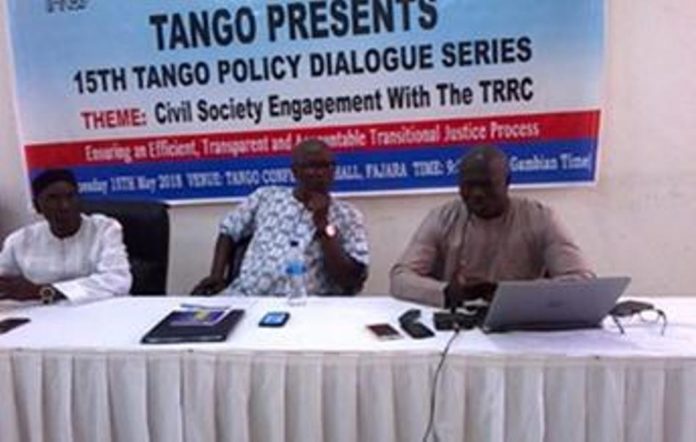By: Kebba AF Touray
Serrekunda, 15th May, 2018: The Executive Secretary of the Truth, Reconciliation and Reparation Commission, Dr. Baba Galleh Jallow said the Commission will be partnering with TANGO and engage the CSOs and the entire Community through dialogue and discussions on how best to prevent the reoccurrence of dictatorship in the country, disclosing that the process requires an all-inclusive participation of the entire populace in holding them accountable.
He made these remarks on Tuesday, 15th May 2018 during the 15th policy dialogue on Civil Society Engagement with the TRRC at the TANGO Hall.
He explained that they have embarked on series with the citizens and communities to make their mission of “NEVER AGAIN” a success.
Speaking at the opening Mr. Madi Jobarteh, Program Manager of TANGO said, when injustices occur and there is no process to enable that society to address past injustices and grievances, the tendency for such situation to arise in future is high, as such the Truth Reconciliation and Reparation Commission(TRRC) is meant to push the transitional justice agenda. He pointed out that as CSOs they have a pivotal role to play in ensuring that justice is not only played, but restoration and rehabilitation of rights of victims of human right violations to serve with justice.
Mr Ousman Yabo, Executive Director of TANGO said, the event marks the 15th policy dialogue organized by TANGO, with a view to holding dialogue, opinion sharing and obtaining the views of the people, which he said is of paramount importance to the success of TRRC, the outcome of which headed will affect everybody in the country, indicating that for the past 22 years, every citizen is affected directly or indirectly. While acknowledging the instrumental roles of CSOs towards the success of the TRRC, he tasked the TRRC to do its utmost in ensuring that its activities are transparent, without which, he disclosed, the objective of the Commission would prove fruitless.
Mr. Sheriff Kijera of the Victim’s Center, cited that there should be a separate measure to deal with truth and reconciliation in order to achieve the goals of the transitional justice program and that the TRRC should capacitate the people in monitoring, documentation and analysis during statement taking of the victims to avert re-traumatizing the victims, coupled with grassroots sensitization and participation on human rights violations.
He called on the government to take ownership of the Victim Center and fund its activities without having to rely on foreign aid alone. He added that the government relies on the taxpayer’s money, which he said must be judiciously utilized to educate, develop and create jobs for the citizenry. He added that Victims have been neglected for a long time and that victims brought about the change of government, adding that every citizen is a victim of the dictatorial regime of former government.
At the end of the dialogue, the following recommendations were made towards the success of the TRRC; Civil society needs to be more organized and develop the necessary strategies and plans to work in concert in order to effectively address the pertinent issues affecting the Gambian society including playing its rightful role in the transitional justice process; To advocate for the Gambia Government to take leadership and responsibility to allocate necessary resources to the TRRC despite external support; To promote inclusiveness and popular engagement in order to ensure that all stakeholders are involved in the transitional justice process and in particular in the work of the TRRC; To raise the awareness of the general public to better understand the nature, scope and objectives of transitional justice in order to obtain active popular participation; To utilize active media components in providing information to the general public including the use of traditional communicators as means to popularise the TRRC and transitional justice; To create a civil society platform as a common ground to advocate and engage with the TRRC; To mobilize all other sectors of the civil society, academia and private sector to serve as means to address the needs of victims and other affected sectors; To embark on capacity building of all stakeholders to ensure their effective participation and efficiency in their engagement with TRRC; The TRRC must have an exit strategy to enable the sustainability of the gains including the enforcement of the recommendations of the TRRC and the continued and active participation of stakeholders; To create a follow up mechanism to ensure the development of civil society strategies and the monitoring of the implementation of the resolutions of the policy dialogue.




















